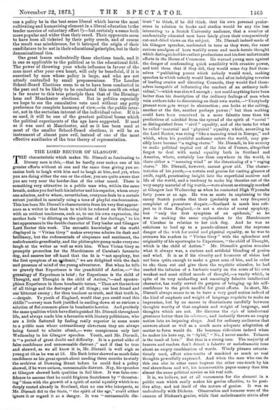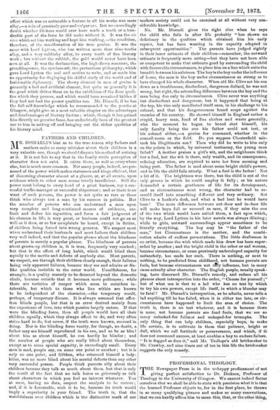THE LORD RECTOR OF GLASGOW.
THE characteristic which makes Mr. Disraeli so fascinating to literary men is this,—that he hardly ever makes one of his greater efforts without at one and the same time giving you oc- casion both to laugh with him and to laugh at him, and yet, when you are doing either the one or the other, you are quite aware that you are very near the border-line of the other mood. There is something very attractive in a public man who, within the same breath, makes you feel both his inferior and his superior, whom every one admires, and to whom, nevertheless, everyone feels to a certain extent justified in mentally using a tone of playful condescension. This has been Mr. Disraeli's characteristic from his very firstappear- ance as a writer in that book to which he referred on Wednesday with an evident tenderness, such as, to use his own expression, the mother feels "in dilating on the qualities of her darlings," to his lastappearance in the double character of Tory leader and Glasgow Lord Rector this week. The sarcastic knowledge of the world displayed in "Vivian Grey" makes everyone admire its dash and brilliancy, but the rodomontade of eloquence and sentiment, the melodramatic grandiosity, and the philosophic pomp make everyone laugh at the writer as well as with him. When Vivian Grey so promptly prescribes for the Marchioness of Carabas's favourite dog, and assume her off-hand that the fit is "not apoplexy, but the first symptom of an fliv ide mic," we are delighted with the dash and presence of mind of the young adventurer. But when he tells us gravely that Experience is the grandchild of Action,—" the genealogy of Experience is brief ; for Experience is the child of Thought, and Thought is the child of Action,"—and apostro- phises Experience in these bombastic terms, "Thou art the saviour of all things and the destroyer of all things ; our best friend and our bitterest enemy ; for thou teachest us truth, and that truth is, —despair. Ye youth of England, would that you could read this riddle 1"—every man feelfi justified in smiling down at so curious a solution of fiat common-place in bombastic heroics. And precisely the same qualities which have distinguished Mr. Disraeli throughout m life, and always made him a favourite with literary politicians, who are a little flattered by feeling really superior in some sense to a public man whose extraordinary cleverness they are always being forced to admire afresh,— were conspicuous only last Wednesday in his Glasgow speeches. Youth, said Mr. Disraeli, is "a period of great doubt and difficulty. It is a period alike of false confidence and unreasonable distrust ;" and if that be true and shrewd, as we all know it ie, Mr. Disraeli is well nigh as young at 68 as he was at 18. His Bath letter showed as much false confidence as his great speech about needing three months to study the archives of Downing Street before he could find a policy showed, if he were serious, unreasonable distrust. Nay, his speeches at Glasgow showed both qualities in full blow. It was false con- fidence to assume that he could frighten Scotchmen by " threaten. ing " them with the growth of a spirit of social equality which is so deeply rooted already in Scotland, that no one who interprets, as Mr. Disraeli did to the Scots, " the spirit of the age," could either ignore it or regard it as a danger. It was " unreasonable dis- trust " to think, if he did think, that his own personal prefer- ences in relation to books and studies would be any the lees interesting to a Scotch University audience, that a number of academically educated men have lately given their comparatively cut-and-dried views on the subject. Mr. Disraeli indeed made of his Glasgow speeches, moderated in tone as they were, the same curious amalgam of keen worldly sense and mock-heroic thought which distinguished his earliest productions and his first unfortunate efforts in the House of Commons. He warned young men against the danger of confounding quick sensibility with creative power, and told them that if they did, they would some day find them- selves "publishing poems which nobody would read, making speeches to which nobody would listen, and after indulging reveries of leading armies and directing Councils, they would find them- selves incapable of influencing the conduct of an ordinary indi- vidual,"—which was shrewd enough ; nor could anything have been better than his description of the ordinary feelings of men when vain authors take to discoursing on their own works,—"Everybody present soon gets wrapt in abstraction ; one looks at the ceiling, another at the fire, another perhaps yawns ;" but then nothing could have been conceived in a more falsetto tone than his predictions of mischief from the spread of the spirit of " social " as distinguished from "civil" equality, and of the taste for what he called material' and physical' equality, which, according to the Lord Rector, was rising "like a moaning wind in Europe," and which, when his youthful audience enters the world, may pos- sibly have become "a raging storm." Mr. Disraeli, in his anxiety to make political capital out of the fate of France, altogether forgot to deal with social equality both in Scotland and America, where, certainly less than anywhere in the world, is there either a " moaning wind" or the threatening of a " raging storm." Mr. Disraeli, however, cannot grow old. The charac- teristics of his youth,—a certain real genius for casting glances of swift, rapid, penetrating insight into the superficial motives and life of the world, and a tendency to make big theories out of the very empty material of big words,—were almost as strongly marked at Glasgow last Wednesday as when he contested High Wycombe forty years or so ago. He was as acute in explaining to the canny Scotch youths that their (probably not very frequent) complaint of premature despair,—Scotland is much less sub- ject to it than England,—is not a stroke of moral apoplexy, but " only the first symptom of an epidemic," as he was in making the same explanation to the Marchioness of Carabas in relation to her sick dog. And he was as solicitous to lead up to a pseudo-climax about the supreme danger of the wish for social and physical equality, as he was to overawe his readers in " Vivian Grey " with the splendour and originality of his apostrophe to Experience, "the child of Thought, which is the child of Action." Mr. Disraeli's genius remains what it always was, a curious and artificial blending of genius and wind. It is as if his vivacity and keenness of vision had not been quite enough to make a great man of him, and in order to eke them out and give them the requisite stimulus, he had needed the infusion of a barbaric vanity on the score of his own weakest and most stilted moods of thought,—a vanity which, in spite of its very misleading and amusingly falsetto intellectual character, has really served its purpose of bringing up his self- confidence to the pitch needful for great efforts. In short, Mr. Disraeli always seems to us to have a very good notion indeed of the kind of emphasis and weight of language requisite to make an impression, but by no means to discriminate carefully between thoughts worthy of that emphasis and weight of language, and thoughts which are not. He discerns the style of intellectual greatness better than its substance, and instantly throws an empty notion into an imposing shape. And for ordinary audiences that answers about as well as a much more adequate adaptation of matter to form would do. He becomes ridiculous indeed when he makes his hero say, in " Sybil," " No, I never smoke. Tobacco is the tomb of love." But that is a strong case. The majority of hearers and readers don't detect a falsetto or melodramatic tone about an empty combination of words. Windy phrases ostenta- tiously used, affect nine-tenths of mankind as much as real thoughts powerfully expressed. And when the man who can do this can also in other cases impress the other one-tenth by his real shrewdness and wit, his inconvertible paper-money does him almost the same political service as his real coin.
It is, we believe, not at all uncommon for the element in a public man which really makes his genius effective, to be posi- tive alloy, and not itself of the nature of genius. It was so undoubtedly with Dickens. Observation and humour were of the essence of Dickens's genius, while that melodramatic strain after effect which was so noticeable a feature in all his works was mere alloy,—a vein of genuinely poor and vulgar ore. But we exceedingly doubt whether Dickens would ever have made a tenth or a hun- dredth part of the fame be did make without it. It was the vis viva which set him working and kept him working,—the condition, therefore, of the manifestation of his true genius. It was the same with Lord Lytton, who has written more than nine-tenths alloy, and a very rubbishy alloy, to every tenth of fine literary work ; but without the rubbish, the gold would never have been seen at all. It was the declamation, the high-flown romance, the grandiloquence, the spurious art, the pretentious philosophy, which gave Lord Lytton the zeal and motive to write, and so made him an opportunity for displaying his skilful study of the world and of fashionable diplomacy. The showy element in men of genius is generally a bad and artificial element., but quite as generally it is the goad which drives them on to the exhibition of the finer quali- ties which they possess, and which would have remained hidden if they had not had the poorer qualities too. Mr. Disraeli, if he has the full self-knowledge which he recommended to the youths at Glasgow, might give us a most valuable chapter on the advantages and disadvantages of literary fustian ; which, though it has gained him directly no genuine fame, has undoubtedly been of the greatest use to him in setting off and bringing out the richer qualities of his literary mind.



































 Previous page
Previous page